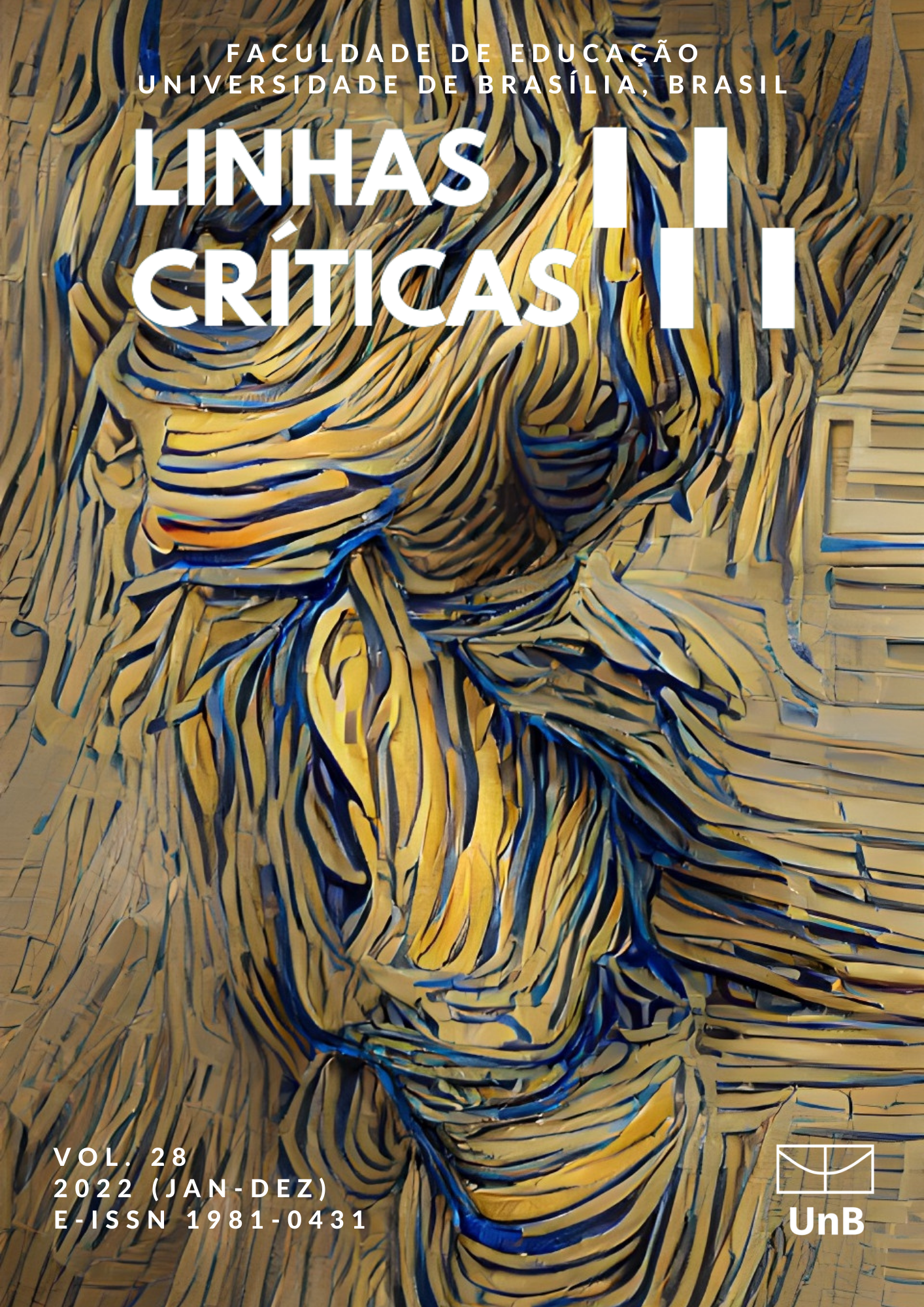Performance: theoretical operator in Education from the Actor-Network Theory
DOI:
https://doi.org/10.26512/lc28202243415Keywords:
Performance, Actor-Network Theory, EducationAbstract
This essay conceptualizes performance from the interlocution between Actor-Network Theory (ANT) references and discusses this construct as a theoretical operator in the field of Education. In addition, the essay synthesizes five researches in Education, which cover in their questions of interest different performances as unfolding of situated pedagogical interventions. The ideas built in this work suggest that the (inter)actions established in sociomaterial networks make it possible to assume performance as affectations that reverberate in states in the world in a procedural, multiple and coexisting way.
Downloads
References
Allain, L. R., & Coutinho, F. Â. (2018). Identidade docente enquanto performatividade: Um estudo entre licenciandos em biologia inspirado na teoria ator-rede. Pro-Posições, 29(3), 359-382. https://doi.org/10.1590/1980-6248-2015-0143
Barad, K. (2007). Meeting the universe halfway. Duke University Press.
Callon, M. (2008). Entrevista com Michel Callon: Dos estudos de laboratório aos estudos de coletivos heterogêneos, passando pelos gerenciamentos econômicos. Sociologias, 19, 302-321. https://doi.org/10.1590/S1517-45222008000100013
Coutinho, F. Â., Silva, A. P., Santiago, F. F., & Faria, E. S. de (2017). As ontologias de um desastre ambiental. Um estudo sobre uma controvérsia instaurada em uma licenciatura do campo. Investigações em Ensino de Ciências, 22(1), 222-236. https://doi.org/10.22600/1518-8795.ienci2017v22n1p222
Coutinho, F. Â., & Viana, G. M. (2019). Alguns elementos da Teoria Ator-Rede. Em F. Â. Coutinho, & G. M. Viana (Orgs.), Teoria Ator-Rede e educação (pp. 17-33). Apris.
Freire, L. de L. (2006). Seguindo Bruno Latour: Notas para uma antropologia simétrica. Comum, 11(26), 46-65. https://app.uff.br/riuff/bitstream/handle/1/12232/latour.pdf
Freire, L. de L. (2021). Humanos, não humanos… Ação! Considerações sociológicas em torno de um programa de pesquisa. Em G. Alzamora, J. Ziller, & F. Â. Coutinho (Orgs.), Dossiê Bruno Latour (pp. 113-135). Editora da UFMG.
Freitas, A. P. da S., & Coutinho, F. Â. (2018). Performando um espaço de reflexão sobre sistemas de conhecimento a partir de um debate: Experiência em uma turma de licenciatura em educação do campo. Cadernos CIMEAC, 8(1), 283-302. https://doi.org/10.18554/cimeac.v8i1.2832
Gee, J. P. (2000). Identity as an Analytic Lens for Research in Education. Review of Research in Education, 25, 99-125. https://doi.org/10.2307/1167322
Giddens, A. (1984). The Constitution of Society. Polity Press.
Houaiss, A. (2009). Performance. Em Dicionário eletrônico Houaiss da Língua Portuguesa. Editora Objetiva.
Latour, B. (1994). Jamais fomos modernos. Ed. 34.
Latour, B. (2000). Ciência em ação: Como seguir cientistas e engenheiros sociedade afora. Editora da UNESP.
Latour, B. (2001). A esperança de Pandora. EDUSC.
Latour, B. (2012). Reagregando o social: Uma introdução à teoria do Ator-Rede. EDUFBA.
Latour, B. (2015). Faturas/Fraturas: Da noção de rede à noção de vínculo (T. Rifiotis, D. F. Petry, & J. Segata, Trads.). Ilha Revista de Antropologia, 17(2), 123-146. https://doi.org/10.5007/2175-8034.2015v17n2p123
Law, J. (2002). Aircraft Stories: Decentering the Object in Technoscience. Duke University Press.
Law, J. (2004). After method: Mess in social science research. Routledge.
Law, J. (2007). Actor Network Theory and material semiotics. http://heterogeneities.net/publications/Law2007ANTandMaterialSemiotics.pdf
Law, J. (2009). Collateral Realities. http://www.heterogeneities.net/publications/Law2009CollateralRealities.pdf
Lemos, A. (2013). A comunicação das coisas: Teoria ator-rede e cibercultura. Annablume.
Lemos, A. (2014). Mídia, tecnologia e educação: Atores, redes, objetos e espaço. Em R. N. Linhares, C. Porto, & V. Freire (Orgs.), Mídia e educação: Espaços e (co)relações de conhecimentos (pp. 11-28). EdUNIT. https://www.pe.senac.br/congresso/anais/2018/pdf/artigos-palestrantes/M%c3%addia,%20tecnologia%20e%20educa%c3%a7%c3%a3o_%20atores,%20redes,%20objetos%20e%20espa%c3%a7oTexto-%20Andre%20Lemos.pdf
Lima, M. R. de, & Nascimento, S. S. do (2021). Pensar e agir “fora da caixa”: Jogo digital e produção de afetações pedagógicas na formação inicial de professores. Ciência & Educação (Bauru), 27. https://doi.org/10.1590/1516-731320210048
Melo, M. de F. A. de Q. (2008). Mas de onde vem o Latour? Pesquisas e Práticas Psicossociais, 2(2), 258-268. https://ufsj.edu.br/portal-repositorio/File/revistalapip/queiroz_melo_artigo.pdf
Meneghetti, F. K. (2011). O que é um Ensaio-Teórico? Revista de Administração Contemporânea, 15(2), 320-332. https://doi.org/10.1590/S1415-65552011000200010
Michaelis. (2022, maio 25). Performance. Moderno Dicionário Inglês. https://michaelis.uol.com.br/moderno-ingles/busca/ingles-portugues-moderno/performance
Mol, A. (2008). Política ontológica: Algumas ideias e várias perguntas. Em J. A. Nunes, & R. Roque (Orgs.), Objectos impuros: Experiências em estudos sociais da ciência (pp. 63-78). Edições Afrontamento. https://pure.uva.nl/ws/files/899834/77537_310751.pdf
Moraes, M. O., & Arendt, R. J. J. (2013). Contribuições das investigações de Annemarie Mol para a psicologia social. Psicologia em Estudo, 18(2), 313-321. https://doi.org/10.1590/S1413-73722013000200012
Oliveira, K. E. de J., & Porto, C. de M. (2016). Educação e teoria ator-rede: Fluxos heterogêneos e conexões híbridas. EDITUS.
Priberam. (2022). -Ivo. Priberam dicionário. https://dicionario.priberam.org/-ivo
Quino. (1986). Le Club de Mafalda. Editions Glénat.
Ribeiro, P. T. de C., & Lima, M. R. de. (no prelo). Teoria Ator-Rede e Educação: Uma revisão sistemática. Educação em Foco.
Schveitzer, L. F. (2016). Análise do sufixo -dade: São possíveis alomorfias? uox - Revista Acadêmica de Letras-Português, 3, 59-64. https://ojs.sites.ufsc.br/index.php/uox/article/view/1849/1024
Sørensen, E. (2009). The Materiality of Learning: Technology and Knowledge in Educational Practice. Cambridge University Press.
Venancio, B., Viana, G. M., & Silva, F. A. R. e (2020). Seguindo o rastro do tempo: Um estudo ator-rede de performances de práticas de ensino de licenciandos em ciências biológicas. ACTIO: Docência em Ciências, 5(3). https://doi.org/10.3895/actio.v5n3.11915
Wikipédia. (2022, maio 25). Morfema. Wikipédia. https://pt.wikipedia.org/w/index.php?title=Morfema&oldid=59203359
Published
How to Cite
Issue
Section
License
Copyright (c) 2022 Marcio Roberto de Lima

This work is licensed under a Creative Commons Attribution 4.0 International License.
Authors who publish in this journal agree to the following terms:
-Authors maintains the copyright and grants the journal the right of first publication, the work being simultaneously licensed under the Creative Commons Attribution License which allows the sharing of the work with recognition of the authorship of the work and initial publication in this journal.
- Authors are authorized to enter into additional contracts separately, for non-exclusive distribution of the version of the work published in this journal (eg publish in institutional repository or as a book chapter), with acknowledgment of authorship and initial publication in this journal.
-Authorers are allowed and encouraged to publish and distribute their work online (eg in institutional repositories or on their personal page) at any point before or during the editorial process, as this can generate productive changes as well as increase the impact and the citation of published work (See The Effect of Free Access).



